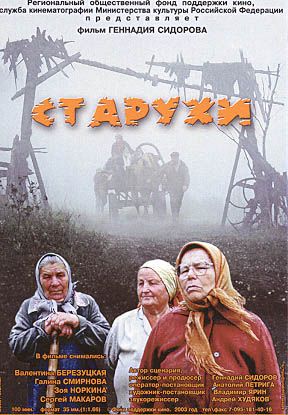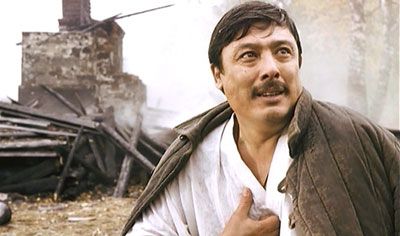Starukhi (Old Women, 2003) * * *
 Starukhi (link to DVD at Amazon)
Starukhi (link to DVD at Amazon)Ah, more obscure Russian films. This is a 2003 award-winning film about a group of old women living in an forgotten village somewhere in an endless sea of forest. They are living in poverty in these run-down wooden houses -- yet they still have their spirit. One of the things that makes this movie unusual is that these old women are not caricatures per se and were played by non-professionals. They are all 3-dimensional characters of various sorts. This is so different from the usual portrayal of old women in film, where they are so often flat characters. Apparently, from the reviews posted by Russians, this is a fairly unusual modern Russian film. Honest yet uplifting (sort of) story about people who's stories are not usually told. This film shows the negative side of the changes since the break-up and privatization of the Soviet Union. The poverty of these women is a direct result of this as they are pensioners and pensioners have not faired well. Corruption, government mismanagement, inflation, etc. Thus, the movie highlights others who have been hurt by the changes since 1991 also.
 The movie does not exactly have a plot. It is mainly a character study of an isolated village and its old women. Nonetheless, there is a major event in the movie and that is the arrival of an Uzbek refugee family into the village. Presumably they are escaping violence from the Uzbek government as violent crackdowns by the government have led to various waves of refugees in recent years. They are assigned to one of the run-down houses. Here again these are honest and human characters. The wife is expecting and is half-depressed to be stuck in a run-down shack in the middle of nowhere. The husband is trying to make the best of it -- he is a good soul caught in a hard situation. The family is rounded out by the man's father and two pre-teen daughters.
The movie does not exactly have a plot. It is mainly a character study of an isolated village and its old women. Nonetheless, there is a major event in the movie and that is the arrival of an Uzbek refugee family into the village. Presumably they are escaping violence from the Uzbek government as violent crackdowns by the government have led to various waves of refugees in recent years. They are assigned to one of the run-down houses. Here again these are honest and human characters. The wife is expecting and is half-depressed to be stuck in a run-down shack in the middle of nowhere. The husband is trying to make the best of it -- he is a good soul caught in a hard situation. The family is rounded out by the man's father and two pre-teen daughters.  Initially most of the old women are verbally hostile to the newcomers -- spewing the typical xenophobisms amongst themselves. But others are more interested to just have someone new to talk with and play with (there is a, ahem, randy old woman who has her eye on the grandfather). In the end, the women come to see that the refugees are really in the same lot at they are. The refugees are not the enemy. They band together to make the best of life. A celebration of a newborn child and strong moonshine -- these are things to enjoy in life rather than grieving the past.
Initially most of the old women are verbally hostile to the newcomers -- spewing the typical xenophobisms amongst themselves. But others are more interested to just have someone new to talk with and play with (there is a, ahem, randy old woman who has her eye on the grandfather). In the end, the women come to see that the refugees are really in the same lot at they are. The refugees are not the enemy. They band together to make the best of life. A celebration of a newborn child and strong moonshine -- these are things to enjoy in life rather than grieving the past.There was also a small reference to WWII in this film that was quite interesting to me. One of the old women corners the Uzbeks and subjects them to one of the long ballads that she makes up. This one is about searching for her father's burial spot. This woman was born in the 20s, and her father fought and died in WWII. That's quite typical since all men were called up and the death rate was about 25%. What's less well known outside of Russia, and from what I've read rarely spoken about within, are the harsh policies with which veterans and their families faced after the war. One of these policies was that soldiers that were MIA (missing in action) were considered deserters and their families would be punished. For example, their children would not be allowed into high school or university or into good jobs. Some 8-9 million Russian soldiers were killed and many were blown to pieces, dumped in mass graves, or otherwise lost in the chaos. So this affected many families. In the movie, this woman's ballad is about tracking down her father's burial spot, how they finally succeed, and how all was then ok with the family. If you didn't know otherwise, you might think this was all about emotional closure, but no, it was about survival in a totalitarian system.
In summary, I would recommend this to someone looking for something original and different. Note in the DVD I got only the Russian was subtitled and not the Uzbek. Also the menu was in Russian so figuring out how to turn on the English subtitles was a puzzle. You need to guess what link takes you to subtitles and then to look for this word английский (English).
Labels: Russian

<< Home